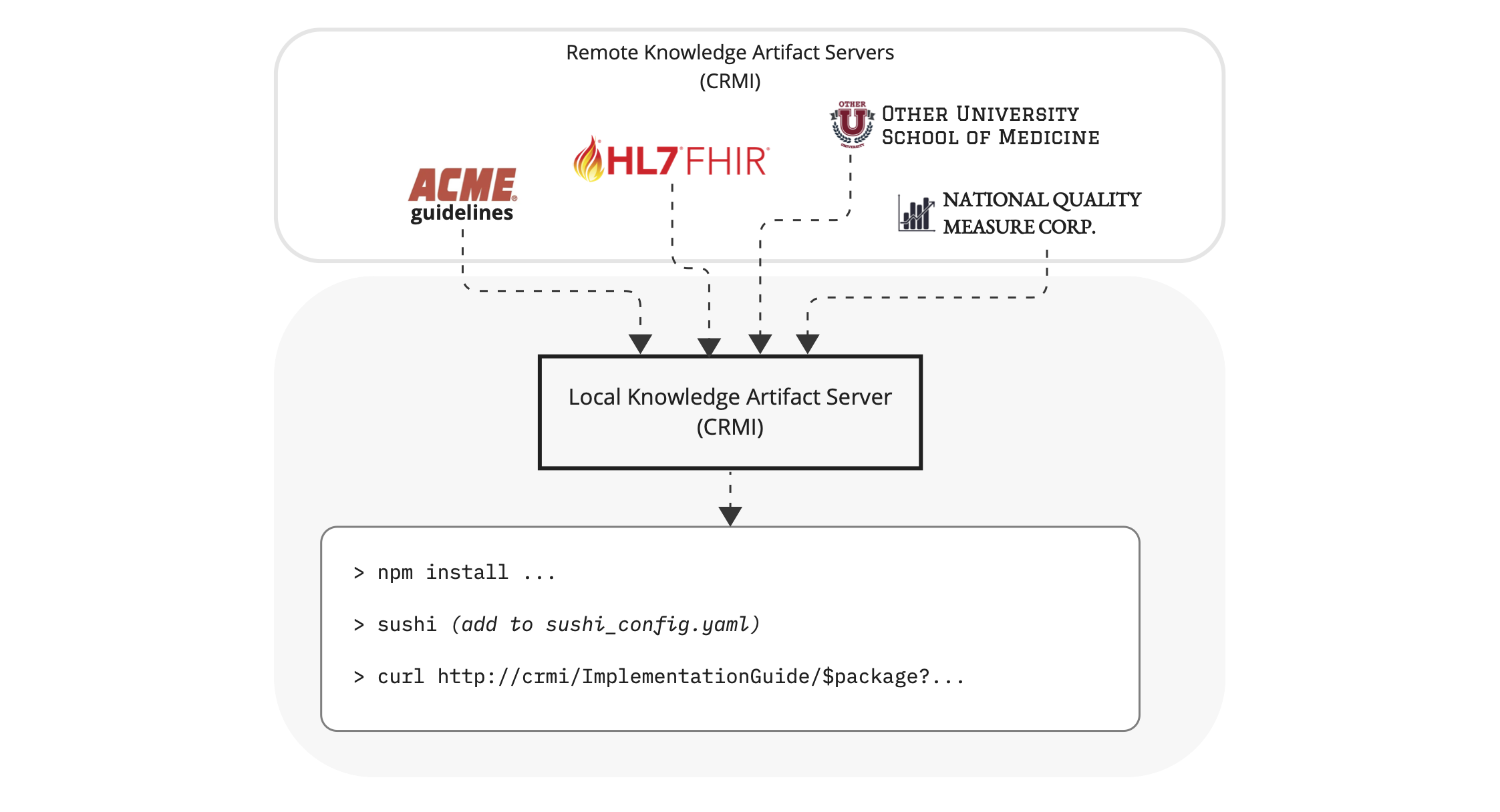This page is part of the Canonical Resource Management Infrastructure Implementation Guide (v1.0.0-ballot: STU1 Ballot 1) based on FHIR (HL7® FHIR® Standard) R4. The current version which supersedes this version is 1.0.0. For a full list of available versions, see the Directory of published versions
Distribution involves the APIs for searching and reading published artifacts. There are a few APIs this IG supports, including:
Like publishing, FHIR Packages are a way to distribute content. This is compatible with IG Publisher, sushi and the npm client.
npm --registry=http://fhir-package-registry install @scope/fhir.uv.test.my-package
Read and search operations can be used to distribute artifacts, see Knowledge Repository and Knowledge Terminology Services capability statements. FHIR read and search SHOULD be available for all canonical resources.
Downstream systems MAY require all content dependencies. These dependencies can cross IG/package boundaries, as intended for reusability (e.g. a common Library could be used by two Measures, or an ActivityDefinition could be used by several PlanDefinitions in different content IGs). Furthermore, some content might have been published outside a content IG/FHIR Package.

To facilitate this, a downstream system MAY use the $package or $data-requirements operation(s) on a canonical resource to resolve dependencies.
NOTE: $crmi.data-requirements allows the client to decide what is needed to download (verses what might already have been downloaded), whereas $package always ships the actual resources.
Both $crmi.package and $crmi.data-requirements operations are available for all canonical resources:
NOTE: To recreate the contents of a FHIR Package, the $crmi.package operation could be called on the ImplementationGuide resource with appropiate parameters to only include local resources defined in the package, e.g., packageOnly set to true.
Here is an exhaustive list of canonical resources with required dependencies for an execution environment, as shown below:
baseDefinition
differential.element[].constraint[].source
differential.element[].binding.valueSet
extension[cpg-inferenceExpression].reference
extension[cpg-assertionExpression].reference
extension[cpg-featureExpression].reference
structure[].url
import[]
group[].rule[]..source[].defaultValue[x]
compose.include[].valueSet
compose.exclude[].valueSet
valueSet
supplements
(none)
sourceCanonical
targetCanonical
group[].element[].target[].dependsOn[].system
group[].element[].target[].product[]..system
unmapped.url
item[]..definition
item[]..answerValueSet
item[]..extension[itemMedia]
item[]..extension[itemAnswerMedia]
item[]..extension[unitValueSet]
item[]..extension[referenceProfile]
item[]..extension[candidateExpression].reference
item[]..extension[lookupQuestionnaire]
extension[cqf-library]
extension[launchContext]
extension[variable].reference
item[]..extension[variable].reference
item[]..extension[initialExpression].reference
item[]..extension[calculatedExpression].reference
item[]..extension[cqf-calculatedValue].reference
item[]..extension[cqf-expression].reference
item[]..extension[sdc-questionnaire-subQuestionnaire]
relatedArtifact[].resource
library[]
profile
location
productReference
specimenRequirement[]
observationRequirement[]
observationResultRequirement[]
transform
extension[cpg-collectWith]
extension[cpg-enrollIn]
extension[cpg-reportWith]
relatedArtifact[].resource
library[]
action[]..trigger[].dataRequirement[].profile[]
action[]..trigger[].dataRequirement[].codeFilter[].valueSet
action[]..condition[].expression.reference
action[]..input[].profile[]
action[]..input[].codeFilter[].valueSet
action[]..output[].profile[]
action[]..output[].codeFilter[].valueSet
action[]..definitionCanonical
action[]..dynamicValue[].expression.reference
extension[cpg-partOf]
relatedArtifact[].resource
dataRequirement[].profile[]
dataRequirement[].codeFilter[].valueSet
relatedArtifact[].resource
library[]
group[].population[].criteria.reference
group[].stratifier[].criteria.reference
group[].stratifier[].component[].criteria.reference
supplementalData[].criteria.reference
extension[cqfm-inputParameters][]
extension[cqfm-expansionParameters][]
extension[cqfm-effectiveDataRequirements]
extension[cqfm-cqlOptions]
extension[cqfm-component][].resource
extension[cpg-relatedArtifact].reference
extension[cpg-relatedArtifact].reference
for
manufacturer
ingredient[].itemReference
ingredient[].substanceReference
parameter[].resource
relatedMedicationKnowledge[].reference
monograph[].source
ingredient[].itemReference
reglatory[].reglatoryAuthroity
Canonical references MAY not have been authored with a version. To ensure consistent versions of resources are used by downstream systems, a manifest parameter to specify canonical versions MAY be passed to FHIR operations that use dynamic requirements: $package and $data-requirements; in addition to execution operations that can use a content endpoint to resolve canonical resources such as $apply from CPG and $evaluate-measure from DEQM IG.
More information on manifest specification
Syndication allows broadcasting of content changes to interested parties. The syndication mechanism proposed in the IG MAY be used by downstream systems, or federated Knowledge Artifact Repositories so preemptive downloading, or notification message send to interested parties.
The syndication API SHALL be based on ATOM, an example is shown below:
<!-- see: https://validator.w3.org/feed/docs/atom.html -->
<feed xmlns="http://www.w3.org/2005/Atom" xmlns:hl7="http://hl7.org/fhir/uv/crmi/syndication">
<title>HL7 CRMI Knowledge Artifact Server Feed</title>
<link rel="self" type="application/atom+xml" href="https://crmi-server/syndication/v1/feed.xml" />
<id>urn:uuid:e39958d4-380e-4252-8707-6afeff8b7911</id>
<updated>2023-01-01T01:00:00Z</updated>
<entry>
<id>urn:uuid:2c466218-337c-3367-95d9-57f65cd1a572</id>
<title>SomeMeasure Package</title>
<updated>2020-08-23T23:37:17Z</updated>
<published>2020-08-23T23:37:17Z</published>
<hl7:artifactVersion>0.0.0</hl7:artifactVersion>
<hl7:artifactType>package</hl7:artifactType>
<hl7:fhirVersion>4.0.1</hl7:fhirVersion>
<hl7:publishAction>publish</hl7:publishAction>
<author>
<name>SomeMeasure Agency</name>
<uri>http://www.measure.org</uri>
<email>help@measure.org</email>
</author>
<!-- when publishing a new FHIR package, we expose both the package tarball -->
<link rel="alternate" type="application/fhir+gzip"
href="https://crmi-server/packages/some.fhir.uv.somemeasure/-/some.fhir.uv.somemeasure-0.0.0.tgz" />
<!-- also include a Bundle transaction of all resources in the direct package with conditional create url and version -->
<link rel="alternate" type="application/fhir+json"
href="https://crmi-server/Bundle/f0099e15-3c06-4905-ba65-86749757fe80" />
<summary>Contains updates to SomeMeasure, a quality measure you need in your life.</summary>
<rights>Copyright 2019 SomeMeasure Agency. This content contains information which is protected
by copyright. All Rights Reserved. No part of this work may be reproduced or used in any form
or by any means - graphic, electronic, or mechanical, including photocopying, recording,
taping, or information storage and retrieval systems - without the permission of the
SomeMeasure Agency.</rights>
</entry>
<entry>
<id>urn:uuid:16d8afdf-79d4-4dfe-87ce-cfc6cd186f62</id>
<title>ValueSet ABC Removed</title>
<updated>2020-08-23T23:37:17Z</updated>
<hl7:fhirVersion>4.0.1</hl7:fhirVersion>
<hl7:artifactType>resource</hl7:artifactType>
<hl7:publishAction>unpublish</hl7:publishAction>
<!-- this is a transaction bundle with a conditional delete using the canonical url and version -->
<link rel="alternate" type="application/fhir+json; fhirVersion=4.0"
href="https://crmi-server/Bundle/b8e21acc-a8ee-41d5-acac-b7331d675fbe"/>
</entry>
<entry>
<id>urn:uuid:c4ae3f0f-2aaf-4afc-9752-e5d856b45461</id>
<title>Update FHIR Library</title>
<updated>2020-08-23T23:37:17Z</updated>
<hl7:artifactVersion>0.2.1</hl7:artifactVersion>
<hl7:artifactType>resource</hl7:artifactType>
<hl7:fhirVersion>4.0.1</hl7:fhirVersion>
<hl7:publishAction>publish</hl7:publishAction>
<!-- this is a transaction bundle with a conditional create using the canonical url and version -->
<link rel="alternate" type="application/fhir+json; fhirVersion=4.0"
href="https://crmi-server/Bundle/d654dcde-ba89-4f6e-9024-bced216d58e9"/>
</entry>
</feed>
Uplinks or mirrors are common in software artifact registries. Many times organizations have a virtualized registry that can route installation requests either locally (for local, private packages) or remotely to configured uplinks as show below:

This can simplify tooling for distribution to downstream systems, and can decrease brittleness relying on upstream systems to be available.
Systems using sharable content, including: authoring systems, clinical data repositories, quality measure engines, decision support engines, care management systems, and assessment filler applications.
Distribution client capabilities